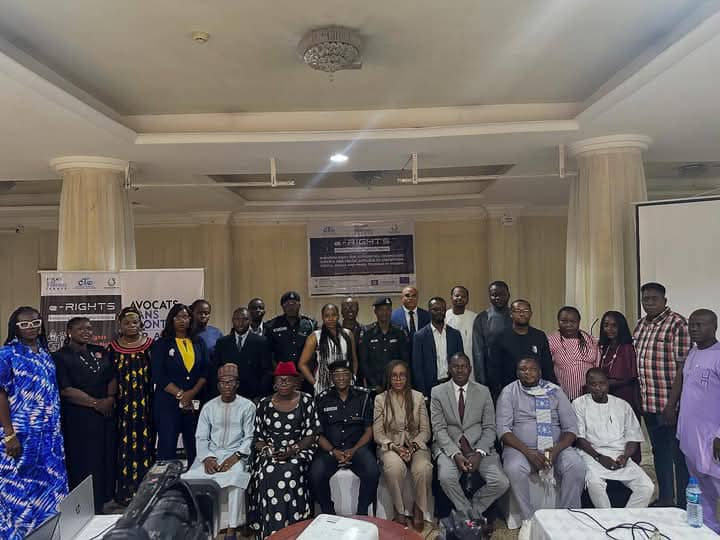By Ugonna Agu, Anambra

In a call for greater synergy between the media and law enforcement agencies, stakeholders at a Situation Room convened under the e-RIGHTS project by Avocats Sans Frontières France (ASF France) emphasized the need to foster understanding, respect, and cooperation between both parties to strengthen media freedom and digital rights in Nigeria.
Speaking at the event, the Country Director of ASF France, Mrs. Angela Uzoma-Iwuchukwu, underscored the critical role of the media in democratic societies.
“The media play a vital role in holding those in power accountable, providing a voice for the voiceless, and fostering informed public discourse,” she said.
“However, journalists often face challenges in carrying out their duties, including harassment, intimidation, and violence,” she added, calling on law enforcement to ensure journalists can work safely and freely.
Outlining the objectives of the Situation Room, Mrs. Uzoma-Iwuchukwu said it aims to identify key challenges, share best practices, and develop recommendations to improve media freedom and digital rights.
She urged participants to “develop guidelines for law enforcement agencies to interact with journalists, particularly in situations involving protests, investigations, or emergencies,” and to “enhance digital literacy among law enforcement to better understand and address online threats.”
“As we work together to address these challenges,” she said, “I urge us to be guided by the principles of freedom of expression, human rights, and the rule of law.”
Delivering a lecture titled ‘Bridging the Gap: Security Agencies and Journalists’, Dr. Abiodun Odusote, a Senior Partner at Integrity Law Office and Law Professor at the University of Lagos, identified deep-rooted mistrust, lack of comprehensive data on journalists, and misunderstanding of their protection needs as major hurdles.
“To bridge the gap, security agencies must brief the media and the public on threats and the appropriate preventive measures,” he said. “Workshops, conferences, and joint platforms are essential to sensitize the public on security awareness.”
He added, “Security of life and property is the business of every Nigerian. There is a need for media practitioners and security agencies to exchange ideas on how to protect the national security of the country.”
Also speaking, CSP El-Mustapha Sani, Officer in Charge of the Police Complaint Response Unit (PCRU) of the Nigerian Police Force, thanked ASF France for creating a space for police and the media to engage constructively.
He explained that the PCRU platform was designed to allow citizens to report police misconduct in real time through multiple channels—including phone calls, emails, WhatsApp, and Twitter.
“Research has shown that members of the public have a lot to report, but many do not know how to go about it,” he said, noting that the platform now supports complaints in Igbo, Yoruba, and Hausa to enhance accessibility.
“In 2024, 49% of complaints were recorded via digital platforms, up from 35% in 2023,” CSP Sani disclosed. He added that all police commands have been mandated by the Inspector General to establish Public Complaint Units.
He urged the media to collaborate with the police to shed light on the experiences of Nigerians, especially in interactions with law enforcement.
“We must work hand in glove with the media to bring to light what Nigerians go through on the roads at the hands of police officers,” he said.
The Situation Room brought together media professionals, legal experts, and law enforcement officers to push forward a shared agenda of accountability, safety, and citizen empowerment in the digital age.
